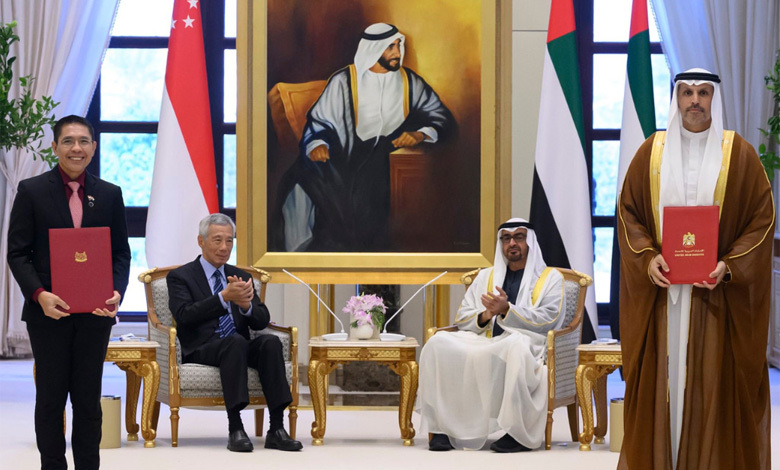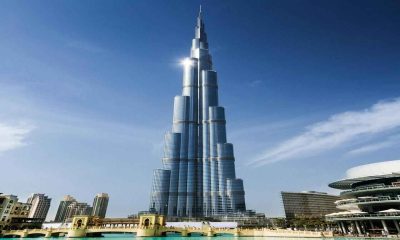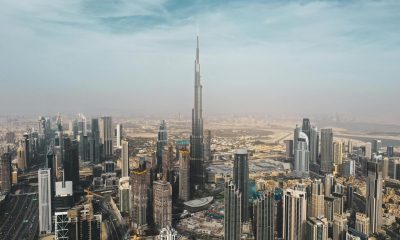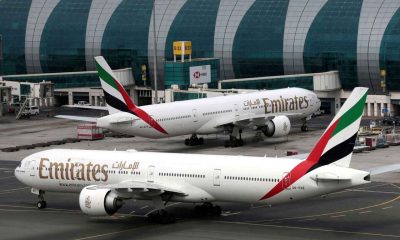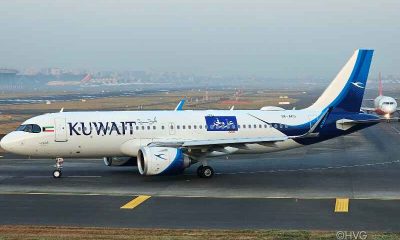Singapore & UAE Sign Deals to Combat Climate Change, Support Green Economy & Boost Food Security
At the COP28 climate conference, which the UAE will host next month, Singapore and the UAE have inked eight agreements, reinforcing their pledges to cut carbon emissions, adapt to climate change, and assist countries that are vulnerable to it.
To discuss bilateral relations and advance their climate-related commitments, UAE President Sheikh Mohamed Bin Zayed Al Nahyan hosted Singapore Prime Minister Lee Hsien Loong in Abu Dhabi one month before the UAE hosted COP28.
Six of the eight agreements that the two leaders signed during the meeting had to do with digital technology and climate change. At the next UN climate summit, these included agreements to meet aggressive climate goals about reducing emissions, adjusting to the climate crisis, and providing financial support to nations at risk of climate change.
“The magnitude of the negative consequences of climate change that are already causing economic and non-economic losses and damage, and are being witnessed globally, especially by the most vulnerable, was expressed as a source of concern by both leaders,” the two nations stated in a joint statement.
To achieve their climate goals and create green jobs, Singapore and the UAE decided to strengthen their cooperation in the areas of low-carbon energy, food security, and the green economy. Both countries have committed to achieving net-zero emissions by 2050; the United Arab Emirates was the first in the Gulf to do so by the middle of the century.
Increasing food security and funding for climate
According to Lee and Shiekh Mohamed, the international community’s confidence in the fight against climate change will depend on financial targets being met. They emphasized the significance of the 2009 global agreement to mobilize $100 billion in climate funds annually for developing countries and to double the amount required by those countries by 2025 to address the effects of climate change.
Read More: Wall Street in Saudi Arabia Despite Regional Tensions, An Economic Diplomacy!
Nonetheless, it is widely acknowledged that this objective falls short of the estimated $6 trillion that will be required by 2030 to support these nations by the Paris Agreement. The actual flow of climate finance from developed to developing countries in 2020, according to a report by Oxfam and the Organisation for Economic Co-operation and Development, was between $21 billion and $83.3 billion, significantly less than the agreed-upon amounts.
To assist these weaker countries in coping with loss and damage brought on by climate change, Singapore and the United Arab Emirates have stated that they will support initiatives to manage fresh investment, including a fund. Both nations will collaborate on research and innovation, as well as establish standards and certification for hydrogen fuel and carbon capture and storage, as part of one of the other eight agreements.
The Green Economy Framework Agreement was also signed; under it, Singapore and the UAE will collaborate on low-carbon energy and technology, sustainable solutions, trade, investment, and carbon markets, as well as green transport projects.
Chang Li Lin, Lee’s press secretary, said, “It was a fruitful discussion on the opportunities that decarbonization, including the production of renewables and hydrogen, could bring for the UAE and Singapore.”
The nations also strengthened their current climate change and protection accord, adding food and water security to it. Singapore imports 90% of its food, whereas the United Arab Emirates imports 80–90% of its food. According to the most recent Global Food Security Index, the former is ranked 23rd, but nearly a fifth of its people live in poverty; the latter, which was ranked first in 2019, is now ranked 27th.
Both states intend to increase food security and lessen their dependency on imports. By 2030, Singapore’s 30 by 30 initiative hopes to produce thirty percent of the food consumed locally. By 2025, the UAE intends to increase the value of the food and agriculture sector to $10 billion and generate 20,000 new jobs.
Gulf climate pledges are beset by oil issues.
Li and Sheikh Mohamed also went to the Adnoc offices, where CEO Sultan Al Jaber gave them an update on the UAE’s plans for energy transition. Adnoc is the national oil company of the United Arab Emirates. In addition, he is the president of COP28, which will take place next month and is billed as the first UN climate summit with a food focus. Al Jaber announced in August that the conference’s catering menu will primarily consist of plant-based foods. This is a positive move as it acknowledges the impact of livestock farming on climate change, as it is estimated that 60% of all food emissions come from this industry.
Nonetheless, the COP28 presidency is not without its problems. The UAE has the third-largest net-zero-busting plans for oil and gas expansion in the world, according to the Guardian, and its new fossil fuel developments are incompatible with the 2050 net-zero goals. Furthermore, a leaked document indicates that Adnoc is “currently conducting necessary studies” but hasn’t released a sustainability report or disclosed its emissions since 2016. Furthermore, the UAE’s environmental plans are rated as “insufficient” by the international organization Climate Action Tracker.
Therefore, the UAE and its neighbor Saudi Arabia, which Li also visited before his trip to Abu Dhabi, have several issues to deal with. Singapore praised Saudi Arabia’s Middle East and Saudi Green Initiatives there and said it supported the latter’s adoption of the Circular Carbon Economy strategy. The two nations emphasized the significance of the Paris Agreement and the Framework Convention on Climate Change, emphasizing the necessity of creating and implementing climate agreements that prioritize emissions over sources.
Saudi Arabia launched a sustainable agriculture challenge this year, calling for climate-smart farming solutions to improve food production and address food security. The kingdom has a goal of becoming net-zero by 2060 and has signed agreements to develop alt-protein products with local plants. However, it outpaces the United Arab Emirates to become the country with the largest net-zero-busting plans for oil and gas expansion globally.
Therefore, even though Singapore made a lot of promises during its visit to the Middle East, actual change won’t occur until concrete action is taken.
